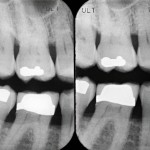
Periodontal bony lesions associated with deep pockets are frequent anatomical sequelae to periodontitis. The aim of this systematic review was to assess the effectiveness of conservative periodontal surgery (CS) for the treatment of periodontitis-related intrabony defects.
The authors searched the Cochrane Oral Health Group specialist trials, Medline and Embase databases and three leading periodontal journals. Only randomised controlled trial with at least 12 months follow-up were included.
The primary outcomes assess were tooth survival, clinical attachment (CAL) gain, probing depth (PD) reduction and gingival recession increase (REC). Weighted means and forest plots were calculated for each outcome variable 12 months after surgery. Long-term stability was explored with RCTs of at least 24 months of follow-up. Subgroup analysis was performed according to the type of flap.
Twenty-seven trials (647 patients) were included .
At twelve months after CS they found
- tooth survival was 98% (IQ: 96.77-100),
- CAL gain 1.65 mm (95% CI: 1.37-1.94; p < 0.0001),
- PD reduction 2.80 mm (CI: 2.43-3.18; p < 0.0001) and
- REC increase 1.26 mm (CI: 0.94-1.49; p < 0.0001).
Longer follow-up showed similar findings.
The authors concluded.
The treatment of intrabony defect with CS is associated with high tooth retention and improvement of periodontal clinical parameters. Clinical performance may vary according to the type of surgical flap used.
Graziani F, Gennai S, Cei S, Cairo F, Baggiani A, Miccoli M, Gabriele M, Tonetti M. Clinical performance of access flap surgery in the treatment of the intrabony defect. A systematic review and meta-analysis of randomized clinical trials. J Clin Periodontol. 2011 Nov 27. doi: 10.1111/j.1600-051X.2011.01815.x.[Epub ahead of print] PubMed PMID: 22117895.
